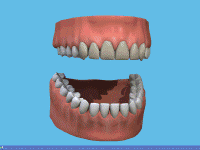
BARRIER WHITENING
Q What does tooth whitening do?
A Tooth whitening can be a highly effective, yet very simple way, of lightening the colour of teeth without removing any of the tooth surface. It cannot make a colour change, but lightens the existing colour.
Q What does the procedure involve?
A The dentist applies a chemical barrier to the gums, which will protect them during the whitening process. The whitening solution is then applied to the teeth and the chemical is then activated using heat, or heat and light combined.
Once the whitening process is finished the barrier will be easily removed in one piece.
If the tooth has been root treated, the canal, which previously contained the nerve, may be reopened and the whitening product is put in.
Q How long does the procedure take?
A The process would normally take over an hour but your dentist will advise you on your specific requirements.
Q Will I be happy with the results?
A Treatment results may vary depending on the original shade of the teeth. Teeth will tend to darken slightly over time. The effect lasts for around 1 to 3 years, although sometimes it can last longer.
Q When might whitening not work?
A Whitening can only lighten your existing tooth colour. For a change to specific chosen shade veneering is another option. Whitening also works on natural teeth. It will not work on any type of ‘false teeth. This includes dentures, crowns and veneers. If dentures are stained or discoloured, it may be worth visiting the dentist and asking him or her to clean them. Stained veneers, crowns and dentures may need replacing. Again, ask your dentist.
Q How do I care for my teeth after whitening?
A Talk to your dentist about maintaining the colour of your teeth, and the products that are available for keeping the effect. Each individuals lifestyle needs to be assessed but good oral hygiene and regular visits to the hygienist will help to maintain the effect for longer.
Some people find that their teeth are sensitive for the first few days after treatment, but this wears off after a short while. Your dentist will advise you of the products you can use to counteract this.
